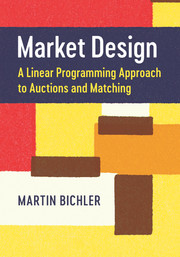11 - Matching Markets
from Part III - Approximation and Matching Markets
Published online by Cambridge University Press: 08 December 2017
Summary
So far, we have assumed that monetary transfers among market participants are possible. This is not always the case and in many situations resources need to be allocated on the basis of the preferences of the market participants but we cannot use a payment rule to incentivize truthfulness. Gibbard (1973) proved that any non-dictatorial voting scheme with at least three possible outcomes cannot have dominant strategies for all agents (see section 3.1).
Rather than deterministic rules, one might hope for randomized and truthful rules. However, Gibbard (1977) showed that every strategy-proof mechanism is a lottery over deterministic mechanisms, each of which either has not more than two alternatives or is dictatorial. This implies that random dictatorships are the only strategy-proof and ex post efficient probabilistic social choice functions. In random dictatorships one voter is picked at random and her most preferred alternative is implemented as the social choice. Random dictatorship is known to be the only rule satisfying strategy-proofness and ex post efficiency. When indifferences are also allowed, random serial dictatorship (RSD) is a well-known generalization of random dictatorship that retains both properties (Aziz et al., 2013). In RSD, dictators are invoked sequentially and ties between most preferred alternatives are broken by subsequent dictators. For the assignment of objects, the agents are ordered randomly and the most preferred package of items is assigned to one agent after the other in this order. Random serial dictatorship can be unfair in the sense that all objects could be assigned to a single agent. However, one can put a cap on the maximum number of objects allocated to each agent, a modification which does not compromise strategy-proofness. We define the mechanism in more detail in the context of two-sided matching (see section 11.2.1), although it is normally used for voting or one-sided matching problems.
Non-dictatorial mechanisms are possible for more restricted environments even without monetary transfers, as the theory of matching with preferences shows. This theory has found many applications and we discuss the key concepts in this chapter.
- Type
- Chapter
- Information
- Market DesignA Linear Programming Approach to Auctions and Matching, pp. 206 - 237Publisher: Cambridge University PressPrint publication year: 2017



